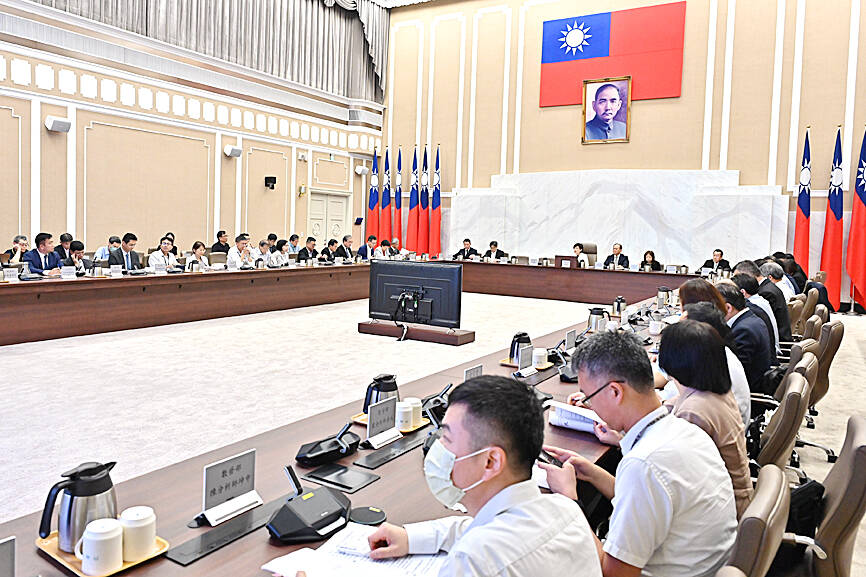The Second Special Police Corps’ presence at critical infrastructure has improved the protection of such sites, and critical infrastructure personnel are beginning to propose countermeasures against possible security risks posed by uncrewed aerial vehicles (UAV) and drones, Executive Yuan Vice Premier Cheng Li-chun (鄭麗君) said on Monday.
Cheng also instructed the Second Special Police Corps to help identify possible threats to critical infrastructure and establish standard countermeasure protocols.
She was discussing the Executive Yuan’s first national security policy report of the year, produced by the Homeland Safety Office on critical infrastructure countermeasures against UAVs and drones.

Photo courtesy of the Executive Yuan
All critical infrastructure facilities have proposed measures to establish no-fly zones and improve detection and interference capabilities along their perimeters, the report said.
The authorities are expected to collaborate with the Homeland Safety Office in implementing the policies and provide the government with statistics for joint systems defense drills, Cheng said.
The office said all units are to hold routine drills to ensure that all critical infrastructure facilities can deter UAVs and drones, she said.
The Executive Yuan would continue to instruct all ministries to inventory and provide adequate protection for all critical facilities and nodes under their jurisdiction, Cheng said.
Ministries should ensure that protective measures take into account all forms of disasters, natural or otherwise, and that measures are routinely examined and revised to achieve the utmost resilience, she said.
The Executive Yuan’s annual national security policy report was established to ensure that government systems work together to maintain national security.
Critical infrastructure is defined as physical and digital public or privately owned assets, manufacturing systems and networks that, if sabotaged or damaged by natural disasters, would affect the running of the government or society; cause injuries or death, an economic recession or changes to the environment; or undermine the nation’s welfare.

SHIPS, TRAINS AND AUTOMOBILES: The ministry has announced changes to varied transportation industries taking effect soon, with a number of effects for passengers Beginning next month, the post office is canceling signature upon delivery and written inquiry services for international registered small packets in accordance with the new policy of the Universal Postal Union, the Ministry of Transportation and Communications said yesterday. The new policy does not apply to packets that are to be delivered to China, the ministry said. Senders of international registered small packets would receive a NT$10 rebate on postage if the packets are sent from Jan. 1 to March 31, it added. The ministry said that three other policies are also scheduled to take effect next month. International cruise ship operators

HORROR STORIES: One victim recounted not realizing they had been stabbed and seeing people bleeding, while another recalled breaking down in tears after fleeing A man on Friday died after he tried to fight the knife-wielding suspect who went on a stabbing spree near two of Taipei’s busiest metro stations, Taipei Mayor Chiang Wan-an (蔣萬安) said. The 57-year-old man, identified by his family name, Yu (余), encountered the suspect at Exit M7 of Taipei Main Station and immediately tried to stop him, but was fatally wounded and later died, Chiang said, calling the incident “heartbreaking.” Yu’s family would receive at least NT$5 million (US$158,584) in compensation through the Taipei Rapid Transit Corp’s (TRTC) insurance coverage, he said after convening an emergency security response meeting yesterday morning. National

PLANNED: The suspect visited the crime scene before the killings, seeking information on how to access the roof, and had extensively researched a 2014 stabbing incident The suspect in a stabbing attack that killed three people and injured 11 in Taipei on Friday had planned the assault and set fires at other locations earlier in the day, law enforcement officials said yesterday. National Police Agency (NPA) Director-General Chang Jung-hsin (張榮興) said the suspect, a 27-year-old man named Chang Wen (張文), began the attacks at 3:40pm, first setting off smoke bombs on a road, damaging cars and motorbikes. Earlier, Chang Wen set fire to a rental room where he was staying on Gongyuan Road in Zhongzheng District (中正), Chang Jung-hsin said. The suspect later threw smoke grenades near two exits

The Forestry and Nature Conservation Agency yesterday launched a gift box to market honey “certified by a Formosan black bear” in appreciation of a beekeeper’s amicable interaction with a honey-thieving bear. Beekeeper Chih Ming-chen (池明鎮) in January inspected his bee farm in Hualien County’s Jhuosi Township (卓溪) and found that more than 20 beehives had been destroyed and many hives were eaten, with bear droppings and paw prints near the destroyed hives, the agency said. Chih returned to the farm to move the remaining beehives away that evening when he encountered a Formosan black bear only 20m away, the agency said. The bear